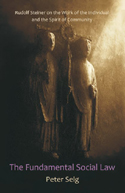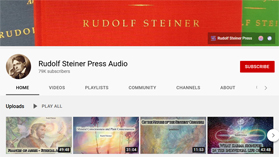
-
THE FUNDAMENTAL SOCIAL LAW
Rudolf Steiner on the Work of the Individual and the Spirit of Community
Peter Selg

The healthy social life is found When in the mirror of each human being The whole community finds its reflection And when in the community The virtue of each one is living.
Rudolf Steiner understood that human social, ethical, and moral development lagged far behind what had been achieved in knowledge, science, and technology; and that what human beings had achieved in these fields rested on what caused social and moral life to be untenable for so many, namely, the universal rule of egoism and self-interest.
In 1905, a historic year of political and economic crises, Rudolf Steiner formulated what he called the basic "social axiom" or "the cosmic law of work": The well-being of an entire group of individuals who work together is the greater, the less individuals claim the income resulting from their own accomplishments for themselves, that is, the more they contribute this income to their fellow workers and the more their own needs are met not through their own efforts but through the efforts of others
Underlying this "fundamental social law" is the seminal realization that human social reality pivots on the question of work and compensation. Does one work for oneself, for one's salary? Or does one work for others, the community or larger society? For Rudolf Steiner, it was critical to understand that work should be a free deed. In other words, work and income should be completely separated.
In this profound work, Peter Selg traces how, at the end of the Great War, with Steiner's tireless efforts for the threefold movement, this fundamental socialspiritual insight moved into the center of his activities as an overriding practical and spiritual concern, rephrased as the "motto of social ethics," and deepened and filled with the full reality of Christ's teachings and life.
Anyone interested in a just, equitable, healthy, and spirit-based social future should read The Fundamental Social Law.
Peter Selg was born in 1963 in Stuttgart and studied medicine in Witten-Herdecke, Zurich, and Berlin. Until 2000, he worked as the head physician of the juvenile psychiatry department of Herdecke hospital in Germany. Dr. Selg is now director of the Ita Wegman Institute for Basic Research into AnthroÂposophy (Arlesheim, Switzerland) and professor of medicine at the Alanus University of Arts and Social Sciences (Germany). He lectures extensively and is the author of numerous books, including Seeing Christ in Sickness and Healing (2005); The TheraÂpeutic Eye (2008); A Grand Metamorphosis; (2008); The Figure of Christ (2009); Rudolf Steiner as a Spiritual Teacher (2010); and Rudolf Steiner and the Fifth Gospel (2010). He is marÂried with five children.
April 2012; Trans. Catherine E. Creeger; SB; 136pp; 215 x 140 mm; pb;
£14.99 ISBN 9780880106542

